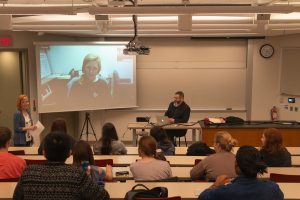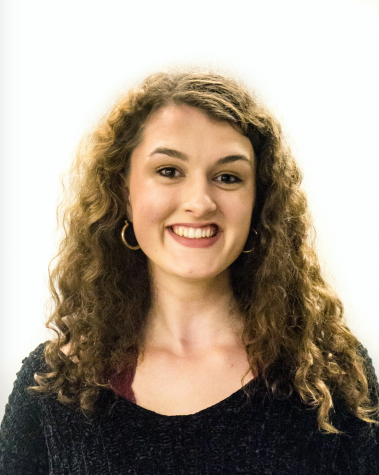Former U.N. Ambassador discusses state of global democracy
November 1, 2018
On Monday afternoon, former U.S. Ambassador to the United Nations (UN) Samantha Power met with students via Skype to discuss her work, her present perspective on diplomacy, and the state of human rights around the world.
After serving as the U.S. Ambassador to the UN during President Barack Obama’s second term, Power returned to Harvard University – where she is currently the Anna Lindh Professor of the Practice at Harvard Kennedy School and Professor of Practice at Harvard Law School.
Chair of the human rights and humanitarianism concentration Wendy Weber facilitated the event with help from the Amy Ostermeier Human Rights Educational Fund, established by friends and family of Amy Ostermeier ’98 to honor her life and work in human rights.
Ostermeier and Power were friends when they worked at the U.S. State Department together, and Ostermeier’s family reached out to Weber about having Power speak to Macalester students.
During the call, Power examined the human rights abuses of both western and eastern countries.
“The current moment is probably the most difficult moment in my lifetime for human rights,” she said. “Unless we understand why human rights are going through a difficult time, it’s going to be harder to understand how we get back on track.”

Power also touched on the importance of maintaining hope for democracy. “There is this view that somehow democratization is dangerous [and that] feeds this culture of despair around democratization and human rights,” Power said. “It fuels human rights abuses, where people are brutally victimized, but then it also fuels probably what some of you feel, which is a sense of a democratic recession. A sense that things aren’t trending that well globally.
“This is a bit of doom loop because if you don’t believe that the system is resilient or that democracy can be saved or revitalized, then the temptation to give up on democracy is very real,” she continued.
“Something I learned after attending the event is that diplomacy is very difficult, and there’s a lot of moving parts to it, but at the end of the day it’s a very rewarding and challenging career,” Andy Han ’19 said. “I’m not going into diplomacy right after college, but it was great to go to this event to learn about it.”
Emma Verges ’21, also at the event, became interested after attending a Sunday night screening of “The Final Year,” a movie that follows Mr. Obama and his foreign policy team during their final year in the White House.
Verges found the event compelling for its feminist perspective.
“It was just really cool to hear a woman speak,” she said. “That might just be because I’m an extrovert, so I don’t feel really suppressed when I speak, but still when I hear a really powerful woman speak, it still hits me in some way. It was kind of a refresher to hear from a woman who was working in a primarily male-dominated field, a male-dominated office, and who has a powerful voice and opinion.”
Power ended the discussion by encouraging the students present to continue their human rights education and their civic engagement. She also offered advice to students who are interested in careers in foreign diplomacy, specifically women. “I’ve found women more prone to doubts and insecurities than their male counterparts, who have the same qualifications as they do. So my main advice for women who want to get into human rights is, yes, it’s hard, but the only thing that can really hold you back if you’re dedicated and you’re willing to put the time in, is your own doubts.”
In the end, Power strongly advocated doing the work – with people, day in and day out, to advance the causes of equality and freedom.
“It is the most rewarding way to spend your time,” she said. “I cannot express how important the work feels as you are doing it, just compared to sitting home and reading tweets or the newspaper, or wanting to throw your shoe at the television. Every day, you feel like you’re doing something for someone.”














Karen Arnold • Sep 11, 2019 at 6:11 pm
as soon as I noticed this site I went on reddit to share some of the love with them.
Boris Simpson • Sep 10, 2019 at 12:14 pm
Hello this is kind of of off topic but I was wondering if blogs use WYSIWYG editors or if you have to manually code with HTML. I’m starting a blog soon but have no coding know-how so I wanted to get guidance from someone with experience. Any help would be enormously appreciated!
Bernadette Mitchell • Sep 9, 2019 at 8:40 am
I would also like to add that if you do not already have an insurance policy or maybe you do not remain in any group insurance, chances are you’ll well really benefit from seeking aid from a health insurance agent. Self-employed or people with medical conditions commonly seek the help of one health insurance dealer. Thanks for your post.
Ollie Linke • Jul 23, 2019 at 10:14 am
Mass parsite http://bit.ly/2W9CVkn